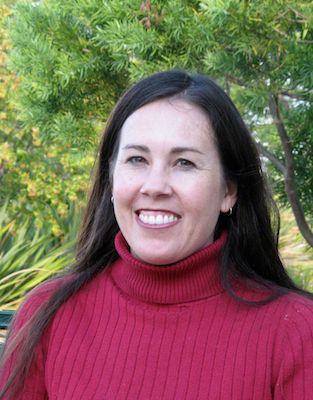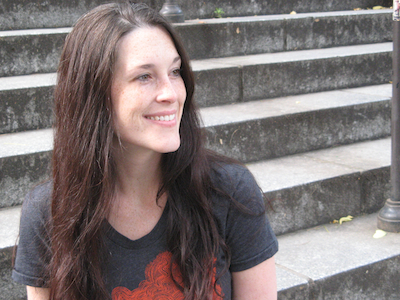An introduction to J L Powers, author of the new novel This Thing Called The Future (Cinco Puntos Press, 2011). The book is about 14-year-old Khosi, who lives in a shantytown on the outskirts of Pietermaritzburg, South Africa with her sister, grandmother, and mother. Khosi struggles to be a big sister, a good daughter and granddaughter, to get through school, and figure out what she wants for her own future. As Khosi navigates the turbulent world of being a teenager and having crushes on boys her own age, she is also confronted with the dangers of being noticed and pursued by older men, and with the epidemic of AIDS in her community. Powers is also the author of the novel The Confessional, and the editor of the forthcoming nonfiction collection That Mad Game: Growing Up in a Warzone. Currently she calls Northern California home, but Powers grew up in El Paso, Texas, and has also spent time living and traveling in South Africa.
Quick Facts on J L Powers
- J L Powers online
- Home: Livermore, California
- Comfort food: Mexican food, tortilla chips and salsa
- Top reads: Benjamin Alire Sáenz—I love his novel Sammy and Juliana in Hollywood; Laura Ingalls Wilder; I love Jon Krakauer, and especially Under The Banner of Heaven; JC Hallman’s book The Devil is a Gentleman; L M Montgomery
- Current reads: One Day The Soldiers Came by Charles London
What are you working on at the moment?
A few things. Next May, this book called That Mad Game: Growing Up in a Warzone is coming out and I’m editing it. The book features writers from around the world talking about coming of age in a warzone.
As far as novels, I’m working on two right now. One, I just dug out of the closet after a three-year hiatus. It’s a strange story about a kid who gets kicked out of his home for drug abuse. He ends up on the streets in San Francisco where he meets this strange girl from a fundamentalist household. She has it in her head that God has told her to do this very dangerous thing, that’s not dangerous to her but dangerous to the people around her. They become friends and enter into this weird relationship because of her religion.
I’m also working on a psycho-thriller that’s set in a small Northern California town. It’s about a girl who gets sucked into this sexy game of danger with her brother’s best friend, who does things to her like kidnap her and put her in the back of a truck and then afterwards things get romantic. Then her brother disappears.
Are the novels you’re working on all aimed at young adult readers?
I write things with young adult protagonists primarily, and so they usually get sold as YA books, but I think they’re really crossover books. They’re appropriate for adult audiences as well.
Where did the idea for This Thing Called the Future come from?
“It came in a lot of layers.”
It came in a lot of layers, but the initial spark was when I was in South Africa in 2006. I was doing a Fulbright-Hays language study program in Zulu. Part of the program was living with a Zulu family in a township. My little Zulu sisters, who were 13 and 14, would come into my room at night and they would tell me stories about their lives, their secrets. They were very good girls.
Many South African households are female-headed. If the mother is lucky enough to have a job, it’s often not where the family is living. A lot of these households are headed by grandmothers, actually, while the mother works in another city during the week. These are families living in houses they’ve had since the days of apartheid, when that was where they could live. And so, these girls, my Zulu sisters, were responsible for everything—they’d come home from school and they’d cook and clean, yet they’d have their secret little lives. I can remember my Zulu sisters telling me that they loved to sneak out and go to parties.
The 13-year-old told me one day when we were home alone that she wasn’t allowed to go to church anymore because her grandmother, Gogo, caught her kissing her boyfriend. I asked her to tell me about her boyfriend, and I really expected this sweet story. But, no, her boyfriend was in his thirties and drove one of the khumbis, the African taxis, around town. So, that’s when I was introduced to the sugar daddy phenomenon.
I learned that this was the major mode of HIV transmission in Africa—older men with these young girls. I thought what would it be like to grow up and have all the normal urges, and normal crushes, but to A) be prayed upon by these older men, and B) to have people all around you dying of AIDS, a sexually transmitted disease. What does this change for you? Does it change anything? Does it make you more cautious, less cautious, fatalistic?
What do you hope readers will take away from your work?
I actually was a little worried about the fact that my books are set everywhere, and seem really disparate. When I met up with my agent and asked if I should be worried about this, she told me no. I very clearly write about young people who are put in situations where they are forced to ask really important questions about the world that they see in front of them. It doesn’t matter where the novels are set.
So, I think that whatever book people read that I’ve written or edited, that would be the thing that I’d want them to take away: What are these important questions? Why are they important to face? I know, that sounds very teacherly. First and foremost, I want people to have fun and enjoy my book, but secondly, I do want them to be confronted with these questions themselves, whether they have answers or not. I want to have the world be tilted a little, to have it look a little bit different to people than before they came into the book.
“I want to have the world
be tilted a little.”
Who do you picture as the ideal reader of your work?
My ideal reader is probably someone who is willing to consider alternatives to the status quo.
Where and when do you prefer to write?
I used to write first thing in the morning—get up, make coffee, and write while I was still in my pajamas. But, I had a baby a year ago, and he gets me up anywhere between 4:30am and 5:30am, and I can’t write then. I’m hoping to get into more of a rhythm now that I have a babysitter. But, I feel like I’m in this constant chasing to catch up mode. I’ve also been doing a lot of book promotion since this last book came out.
Where would you most want to live and write?
Well, I really love South Africa. It would be really great to live in Durban or Cape Town. It would be nice to have a couple places. I also love my hometown of El Paso; the people are wonderful. I also love the Bay Area.
Do you listen to music when you work?
Yes, I do. Music really helps me enter into the character and the setting. For example, for my first novel, The Confessional, I listened to a lot of Mars Volta, Sparta, and At The Drive In, which are homegrown El Paso bands. For This Thing Called The Future, I listened to a lot of South African Kwaito music and Afropop, also Zola, Freshlyground, and Hugh Masekela. It’s always very different, depending on the book.
Do you have a philosophy for how and why you write?
I want to write stuff that does cause people to think. I’d like it to be something lasting. I feel like lasting literature asks important questions about the human experience, and tries to answer them even when those answers are complicated and gray.
“Lasting literature asks
important questions about
the human experience.”
How do you balance content with form?
I create the content and pretty much ignore form until I figure out what’s happened. I feel like I am moving through things like I’m blind; I have a vague idea where my novel will end up. Once I figure out what’s happened, I shape the book. I revise a lot. This Thing Called The Future probably went through seven or eight versions, all substantially different.
What advice would you give to aspiring writers?
The best way to become a better writer is to read a lot. How can you get good at the craft if you don’t see what other people are doing, too? Read what you like, but read a lot. The second thing is to write a lot.
What’s the best advice you’ve been given as a writer?
Do a little bit every day.
“Do a little bit every day.”
What do you find most challenging about writing?
I find that first draft really challenging. I have this vague idea, but I don’t know how to get there. I enjoy the process, but that first draft is really hard. I like revising a lot more.
When you’re not writing, what do you like to do?
I love live music, especially reggae. And travel, I love to travel. Now that the baby is here, I’m doing a lot of fun things with my son—exploring the world.
About J L Powers
J L Powers is an author, editor, small press publisher, and historian of Africa. Powers explores social issues involving violence, sexuality, and race in her books. Novels by J L Powers include The Confessional (Knopf, 2007) and This Thing Called The Future (Cinco Puntos Press, 2011). Powers lives in Northern California with her husband, son, and two weimaraners.
Buy This Thing Called the Future, preferably at your local independent bookstore.
[Toffoli, Marissa B. “Interview With Writer J L Powers.” Words With Writers (November 12, 2011), https://wordswithwriters.com/2011/11/12/jl-powers/.%5D

This Thing Called the Future by J L Powers (Cinco Puntos Press, 2011).




My name is Krishna ,a y ear And a half ago I lost my only child to suicide my beautiful daughter Ashly was 25,feeling so afraid and alone and griefstricken I took a job cleaning a pre school at night by myself the solitude of the job gave me the oppertunity to scream ,cry ,yell,laugh out loud,and remember my daughter’s memory without getting fired,lol enjoying all of the children’s artwork in each class inspired me to Wright a children’s book,it is Ashly story written in a children’s book fomat,i am clueless of how to have my book seen and published .This would be the ultimate memorial to my baby girl .please can anyone offer me some advice?
[…] poet and interviewer Marissa Bell Toffoli interviewed me last month and that interview is now live on her website. A highlight: “I want to have the world be tilted a little, to have it look a little bit […]